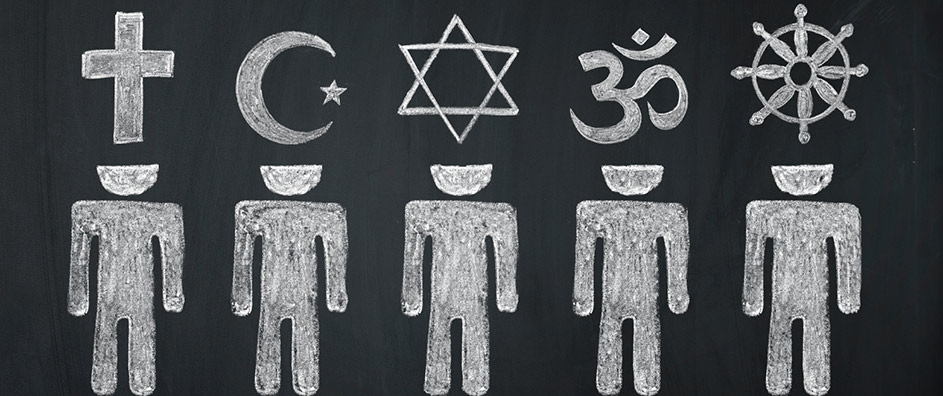The views expressed in our content reflect individual perspectives and do not represent the authoritative views of the Baha'i Faith.
Fasten your seat belts—we’re about to take a very rapid tour of human spirituality, in a few paragraphs.
Anthropologists and archeologists now believe that modern humans emerged about a quarter-million years ago, during the Paleolithic Age, and immediately began to discover their spiritual reality.
RELATED: What is the Difference Between the Mind, Spirit & Soul?
How do they know? Cave paintings. Creating art, it seems, makes us human, uniquely characterizing our innate spirituality. Whether the paintings of hunters stalking animals intended to cast a spell over their prey or recognize the animals’ and the hunters’ spirits, cave painters didn’t just make their art to pass the time—it had a definite spiritual purpose.

Once humans moved out of caves and progressed into small-scale tribal societies, the local spirits they originally venerated in their myths and worship became much more powerful and identifiable. Their deities, potent and awesome, took on a more epic scale. Zeus, Odin, Maat and others inspired respect, fear and obedience in the hearts of the largely uneducated and unlettered populace.
When city-states and kingdoms emerged from smaller societies, leaders, royalty and the clergy began to assume some of the power that local deities and shamans used to wield. Some kings and rulers even identified themselves as gods or deputies of gods, claiming absolute power over their subjects. Typically, each city and cultural group had its own major deity, interpreted by the priests and rulers as they saw fit. Often, people believed in numerous gods and goddesses as a pantheon—a fractious family of deities that then became the source of long-lived oral and literary traditions, meant to teach adults and children about right and wrong, truth and justice, moral behavior and the fate of the soul.
Then, somewhere between four and five thousand years ago, a new spirituality dawned: monotheism. Prophets in the East and in the Middle East taught belief systems that focused on a single, Supreme Being with universal creative power. Those religions spread beyond the normal geographical boundaries, not only because of their teachings but because they appealed to people from different cultures, traditions and places of origin. Their messages, like their theology, were universal, and a few of them gradually became truly global belief systems.
Those great universalist Faiths—Hinduism, Judaism, Zoroastrianism, Buddhism, Christianity and Islam—soon inspired the adherence and captured the imaginations of the vast majority of the world’s peoples. However, they all appeared while the mass of the world’s people remained illiterate, so their clergy controlled knowledge and information. Over time, the clergy often succumbed to corruption and political machinations. This inevitably led to conflicts and power struggles, which created schism. Religions split into sects, became politicized and lost the thrust of their original spirituality. When that occurred, individuals always tried to find their way back to the primary message of Christ or Moses or Muhammad, to re-discover the underlying spiritual truths that animated their faith in the first place. While that happened, eventually a new chapter in the history of religion opened, and a new prophet brought a new Faith and a renewed spirituality to humanity.
RELATED: What Does it Mean to Be “Religious?”
Through it all, most of us struggled to understand our own souls using the tools we had. Regardless of our depth of knowledge, our education, our literacy or our grasp of the mystical, we made the lifelong effort to comprehend the mysteries in ourselves and in the universe. We tried to come to terms with our inner selves. Something inside drove us to explore our spirits. We couldn’t help it.
Today, we call this impulse “spirituality.” We divorce it from religion, which has developed a bad reputation for itself, and name it something a little more vague and undefined. We’ve all heard the phrase a few hundred times: “I’m spiritual, but not religious.” But what does it really mean?
In that sentence, the word “spiritual” has now come to mean authentic, open-minded, thoughtful, profound and real; and the word “religious” often means dogmatic, dictatorial, corrupt, fanatical and narrow-minded. People who apply the SBNR phrase to themselves usually reject religious rituals and hidebound beliefs, disavow the disunity and division in traditional religion, and discard the old definitions and prejudices that separate people—and religions—from one another. They accept a wide latitude of approaches to the unknowable Creator, believe deeply in the reality of the world of the spirit, and welcome a liberal acceptance of the truths embodied in all religions. Hmmm—just like Baha’is do.
Conclusion: if you’re spiritual but not religious, you might be a closet Baha’i:
The fundamental principles of the Prophets are correct and true. The imitations and superstitions which have crept in are at wide variance with the original precepts and commands. Baha’u’llah has revoiced and reestablished the quintessence of the teachings of all the Prophets, setting aside the accessories and purifying religion from human interpretation. – Abdu’l-Baha, The Promulgation of Universal Peace, p. 86.
Inasmuch as the essential reality of the religions is one and their seeming variance and plurality is adherence to forms and imitations which have arisen, it is evident that these causes of difference and divergence must be abandoned in order that the underlying reality may unite mankind in its enlightenment and upbuilding. All who hold fast to the one reality will be in agreement and unity. Then shall the religions summon people to the oneness of the world of humanity and to universal justice; then will they proclaim equality of rights and exhort men to virtue and to faith in the loving mercy of God. The underlying foundation of the religions is one; there is no intrinsic difference between them. Therefore, if the essential and fundamental ordinances of the religions be observed, peace and unity will dawn, and all the differences of sects and denominations will disappear. – Ibid., p. 99.
Try these on for size: Baha’is emphasize the spiritual over the religious. Baha’is accept the unity of all the great Faiths. Baha’is have no dogma, rituals or clergy. Baha’is love others, and avoid prejudice, racism and hatred in all forms. Baha’is believe that science and religion fundamentally agree. Baha’is pray and meditate privately, and publicly mix, consort and socialize with people of all Faiths and no faith. Baha’is accept the truths in all religious and spiritual traditions, and believe that truth is ultimately one. Baha’is work to bring about the oneness of humanity and the unity of the planet. Baha’is revere nature and believe in the spiritual stewardship of our common home. Baha’is, in other words, approach life with intense spirituality, while maintaining a global religious community that welcomes everyone.
You May Also Like
Comments

















Regarding dogmata, the Faith has them aplenty. In fact, you mentioned one - "that science and religion fundamentally agree."
As for emphasizing spirituality over religion, look at official Baha'i websites. The Power of the Holy Spirit is one of the principles of the Faith, listed by Abdu'l-Baha along with the equality of men and women, universal education, etc.; yet you will find no mention of it on Baha'i websites. However, as you said "spirituality" is a vague term, usually associated, in my experience, with the emotions, ...and with not the spirit of man in awful communion with the Spirit of God.
Then there's the independent development of Asian, North, Central and South American shamanism. Along with Australia's rich Aboriginal heritage and so many more. Many of ...which are still alive and practiced today.
I really wish folks would remember that religion is much broader than the single line of Anglo-Saxon history. And some of the old religions still exist in the world. Pagan means any religion that doesn't follow Abraham doctorine. Globally, there's a whole lot of us out here.
Wish you all happy holidays
"As a truck" should have said Asatru
Ask Bahais about gay and lesbian people and you'll know what dogma they don't have.
Abdu'l Baha said: "All religious laws conform to reason, and are suited to the people for whom they are framed, and for the age in ...which they are to be obeyed.
Religion has two main parts:
(1) The Spiritual.
(2) The Practical.
The spiritual part never changes. All the Manifestations of God and His Prophets have taught the same truths and given the same spiritual law. They all teach the one code of morality. There is no division in the truth. The Sun has sent forth many rays to illumine human intelligence, the light is always the same.
The practical part of religion deals with exterior forms and ceremonies, and with modes of punishment for certain offences. This is the material side of the law, and guides the customs and manners of the people." (Paris Talks, pp. 141f.)